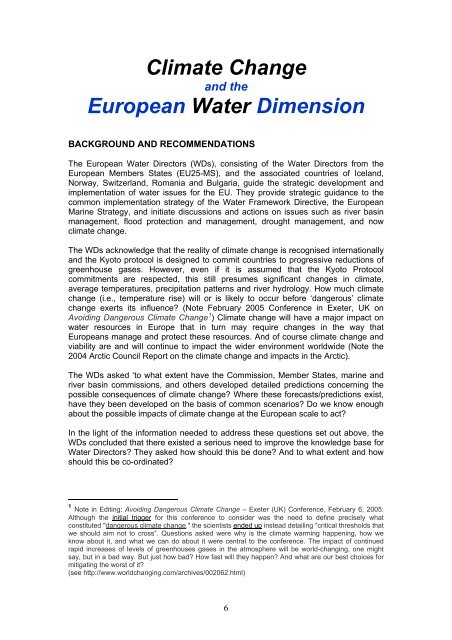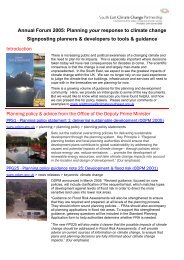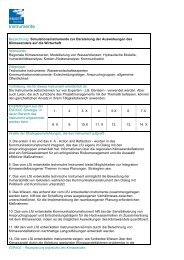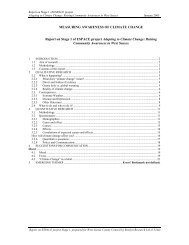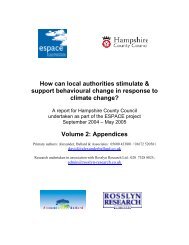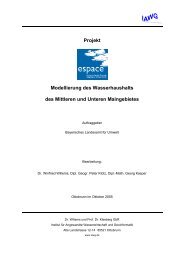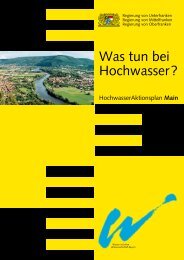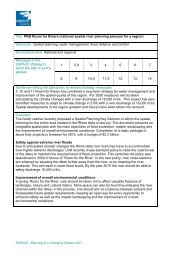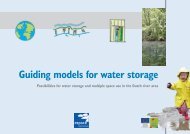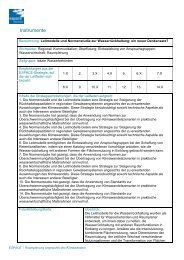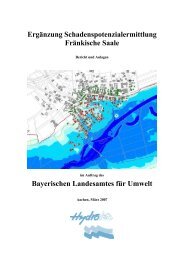Climate Change and the European Water Dimension - Agri ...
Climate Change and the European Water Dimension - Agri ...
Climate Change and the European Water Dimension - Agri ...
Create successful ePaper yourself
Turn your PDF publications into a flip-book with our unique Google optimized e-Paper software.
<strong>Climate</strong> <strong>Change</strong><br />
<strong>and</strong> <strong>the</strong><br />
<strong>European</strong> <strong>Water</strong> <strong>Dimension</strong><br />
BACKGROUND AND RECOMMENDATIONS<br />
The <strong>European</strong> <strong>Water</strong> Directors (WDs), consisting of <strong>the</strong> <strong>Water</strong> Directors from <strong>the</strong><br />
<strong>European</strong> Members States (EU25-MS), <strong>and</strong> <strong>the</strong> associated countries of Icel<strong>and</strong>,<br />
Norway, Switzerl<strong>and</strong>, Romania <strong>and</strong> Bulgaria, guide <strong>the</strong> strategic development <strong>and</strong><br />
implementation of water issues for <strong>the</strong> EU. They provide strategic guidance to <strong>the</strong><br />
common implementation strategy of <strong>the</strong> <strong>Water</strong> Framework Directive, <strong>the</strong> <strong>European</strong><br />
Marine Strategy, <strong>and</strong> initiate discussions <strong>and</strong> actions on issues such as river basin<br />
management, flood protection <strong>and</strong> management, drought management, <strong>and</strong> now<br />
climate change.<br />
The WDs acknowledge that <strong>the</strong> reality of climate change is recognised internationally<br />
<strong>and</strong> <strong>the</strong> Kyoto protocol is designed to commit countries to progressive reductions of<br />
greenhouse gases. However, even if it is assumed that <strong>the</strong> Kyoto Protocol<br />
commitments are respected, this still presumes significant changes in climate,<br />
average temperatures, precipitation patterns <strong>and</strong> river hydrology. How much climate<br />
change (i.e., temperature rise) will or is likely to occur before ‘dangerous’ climate<br />
change exerts its influence? (Note February 2005 Conference in Exeter, UK on<br />
Avoiding Dangerous <strong>Climate</strong> <strong>Change</strong> 1 ) <strong>Climate</strong> change will have a major impact on<br />
water resources in Europe that in turn may require changes in <strong>the</strong> way that<br />
<strong>European</strong>s manage <strong>and</strong> protect <strong>the</strong>se resources. And of course climate change <strong>and</strong><br />
viability are <strong>and</strong> will continue to impact <strong>the</strong> wider environment worldwide (Note <strong>the</strong><br />
2004 Arctic Council Report on <strong>the</strong> climate change <strong>and</strong> impacts in <strong>the</strong> Arctic).<br />
The WDs asked ‘to what extent have <strong>the</strong> Commission, Member States, marine <strong>and</strong><br />
river basin commissions, <strong>and</strong> o<strong>the</strong>rs developed detailed predictions concerning <strong>the</strong><br />
possible consequences of climate change? Where <strong>the</strong>se forecasts/predictions exist,<br />
have <strong>the</strong>y been developed on <strong>the</strong> basis of common scenarios? Do we know enough<br />
about <strong>the</strong> possible impacts of climate change at <strong>the</strong> <strong>European</strong> scale to act?<br />
In <strong>the</strong> light of <strong>the</strong> information needed to address <strong>the</strong>se questions set out above, <strong>the</strong><br />
WDs concluded that <strong>the</strong>re existed a serious need to improve <strong>the</strong> knowledge base for<br />
<strong>Water</strong> Directors? They asked how should this be done? And to what extent <strong>and</strong> how<br />
should this be co-ordinated?<br />
1 Note in Editing: Avoiding Dangerous <strong>Climate</strong> <strong>Change</strong> – Exeter (UK) Conference, February 6, 2005:<br />
Although <strong>the</strong> initial trigger for this conference to consider was <strong>the</strong> need to define precisely what<br />
constituted "dangerous climate change," <strong>the</strong> scientists ended up instead detailing "critical thresholds that<br />
we should aim not to cross”. Questions asked were why is <strong>the</strong> climate warming happening, how we<br />
know about it, <strong>and</strong> what we can do about it were central to <strong>the</strong> conference. The impact of continued<br />
rapid increases of levels of greenhouses gases in <strong>the</strong> atmosphere will be world-changing, one might<br />
say, but in a bad way. But just how bad? How fast will <strong>the</strong>y happen? And what are our best choices for<br />
mitigating <strong>the</strong> worst of it?<br />
(see http://www.worldchanging.com/archives/002062.html)<br />
6


